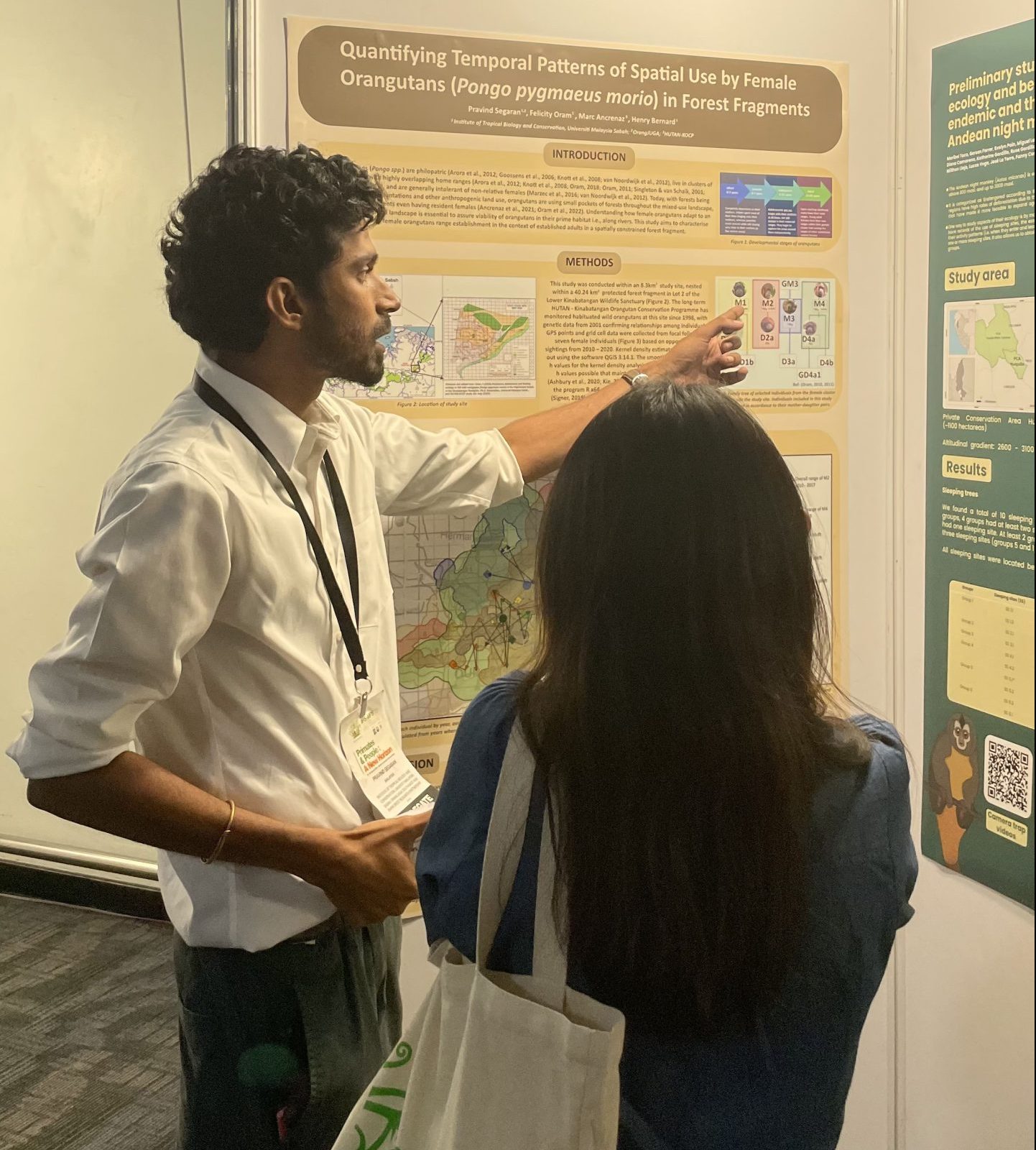Sign up to our newsletter
Subscribe to our wild news! We'll send you a summary of the latest articles. Keep an eye on your inbox!
Not Available

Acknowledgement
On the 19 th -25 th of August thanks to support from the Malaysian Primatological Society and The Habitat Foundation, I was able to attend the IPS-MPS Joint Meeting at Kuching. Here, I was able to not only present my poster on my MSc work, but also grow my knowledge and understanding of primatology through attending the various talks, presentations, and sessions throughout the event.
The poster I presented about my MSc was titled “Quantifying Temporal Patterns of Spatial Use by Female Orangutans (Pongo pygmaeus morio) in Forest Fragments”. During the poster presentation, I was able to share how my study attempts to understand how female orangutans accommodate habitat compression due to forest fragmentation, within a genetic cluster of female orangutans at Lot 2 of the Lower Kinabatangan Wildlife Sanctuary, Sabah. This work was made possible by the fact that this genetic cluster of female orangutans have been studied extensively by HUTAN- Kinabatangan Orangutan Conservation Programme since 1998. Furthermore, genetic relatedness among the seven study individuals has been confirmed through DNA analysis in 2001. Therefore, historical records of ranging data from 2010 up to 2018, as well as on ground data collection together with the orangutan research unit of HUTAN-KOCP from 2019 to 2020 were able to be used for this study. This allows for us to look at the change in range size, position, use density, overlap and shape over time as the daughters of the females with established ranges approach adulthood and form their own ranges. Presenting my MSc work at the IPS-MPS joint meeting was incredibly beneficial to me as I received much advice and feedback on my study, as well as reassurance that helps keep me motivated to the completion of this study.
I am also incredibly grateful to be included in the roundtable session “The Future of Primates in Malaysia” where I also presented some background of the work we do under OrangJuga in the agriculturally dominated landscape of Kinabatangan, where we work to engage oil palm plantations, communities and relevant government agencies in order to better understand and inform stakeholders on orangutan use of the surrounding landscape. What was most inspiring in this session is the overall positive tone of the roundtable session, where we explored topics on the reality of primate conservation on the ground today, working together to overcome silos, engaging industries and government agencies, support for aspiring primatologists and how to strengthen the Malaysian Primatological Society. It wonderful to learn about the work of our colleagues around Malaysia and how we can learn, collaborate and support each other for the common goal of primate conservation.
Some other highlights from the joint meeting for me were being able to attend talks and presentations from primatologists around the world and gaining new information and insights from these talks. This greatly expanded my understanding and thinking on issues and aspects that previously I had been unaware of, and motivated me to start incorporating more aspects that may be relevant and applicable to my work interest, despite these ideas coming from researchers who study other species of primates. Particularly, a big take home message from attending these various talks for me was how we need to adapt to the rapidly changing world around us and how we can fit our conservation work around these changes. Keeping up with rapid development is challenging, but learning how other researchers navigate this has been very motivational and inspiring to me.
Furthermore, I was able to attend the post-symposium workshop on the 25th of August, on the drafting of the Presbytis action plan, where it was incredibly eye opening to me, as I learned how little we know about this understudied genus and the challenges faced by our colleagues in conservation of species that are not as well studied, and also the great work done by researchers and conservation practitioners in navigating these challenges.
Last but not least, the IPS-MPS joint meeting was an amazing opportunity for me to get to know colleagues from not only Malaysia but around the world. Being mostly based in the field at Kinabatangan, I don’t often get the opportunity to meet and learn from colleagues around Malaysia, let alone internationally. This meeting has indeed allowed me to connect with local colleagues and strengthen our support for each other in conservation of primates in the region.
As a whole, attending the IPS-MPS joint meeting 2023 has been an invaluable learning experience for me and has provided me with opportunity to grow as a young primatologist.
Subscribe to our wild news! We'll send you a summary of the latest articles. Keep an eye on your inbox!
Copyright © 2020. Malaysian Primatological Society | Designed by Celine Ng